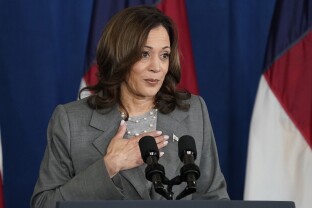For more than half a century, candidates from both major parties have sat down with “60 Minutes” in the weeks before the presidential election. On Monday, CBS aired an interview with only one candidate — an interview that was repeatedly evasive and largely vague.
Ultimately, only Vice President Kamala Harris sat for the “60 Minutes” interview. After agreeing to sit down, Donald Trump apparently backed out over concerns that CBS would fact-check him. (CBS thoroughly called out Trump and his campaign for their “shifting explanations” about why he couldn’t participate.)
But Harris wasn’t exactly an open book. Instead, she frequently answered the question she wished she were asked rather than the one CBS journalist Bill Whitaker did ask.
